
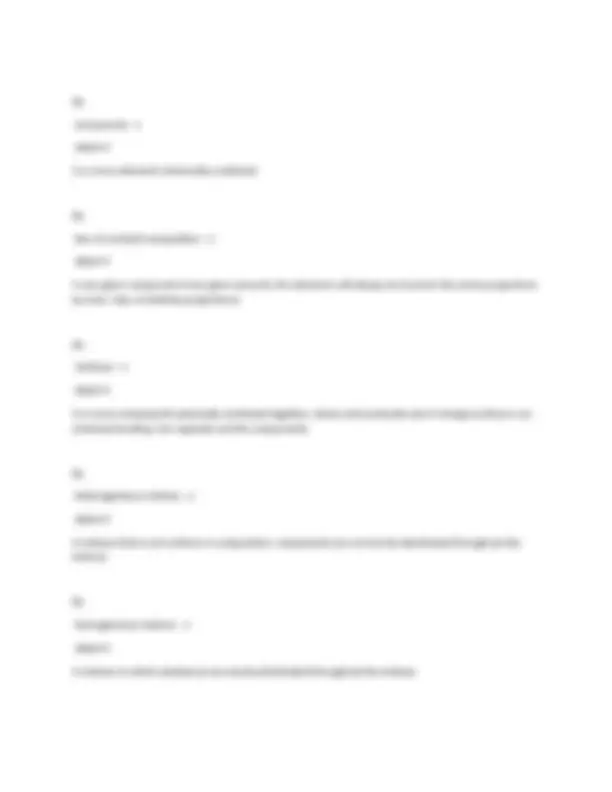
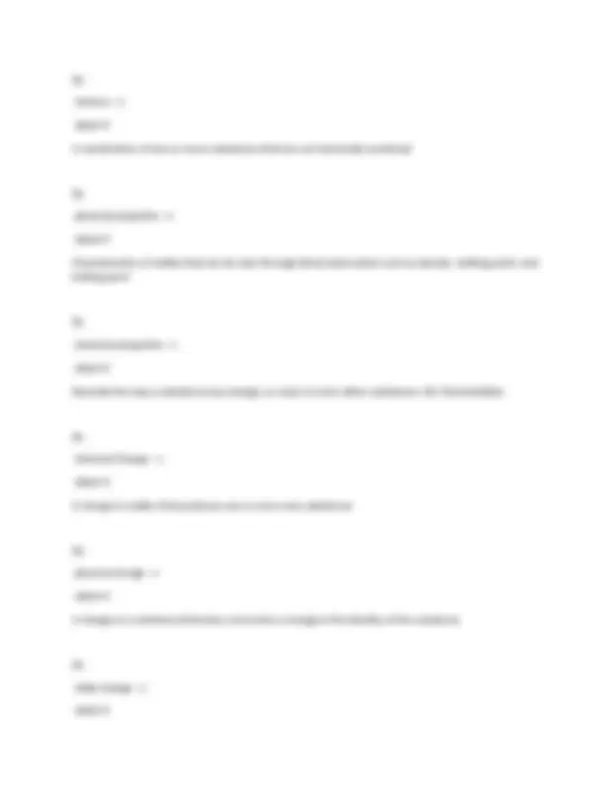
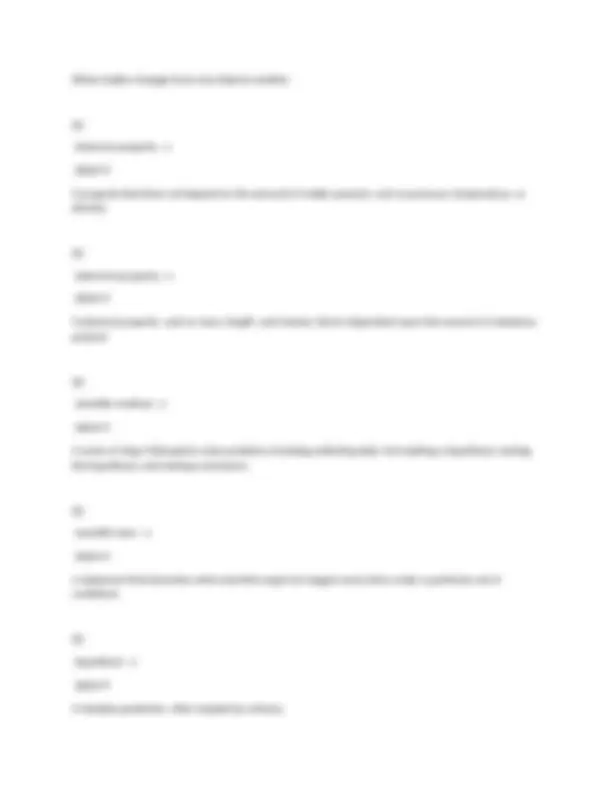
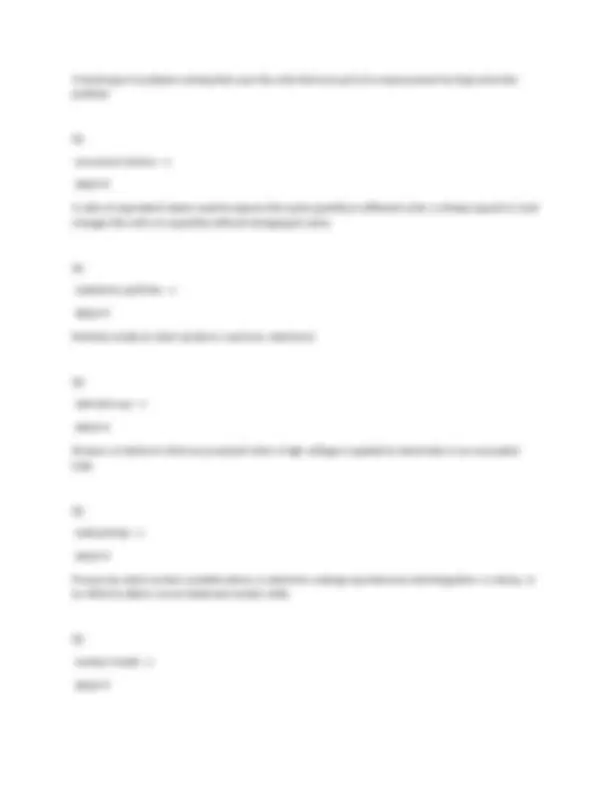
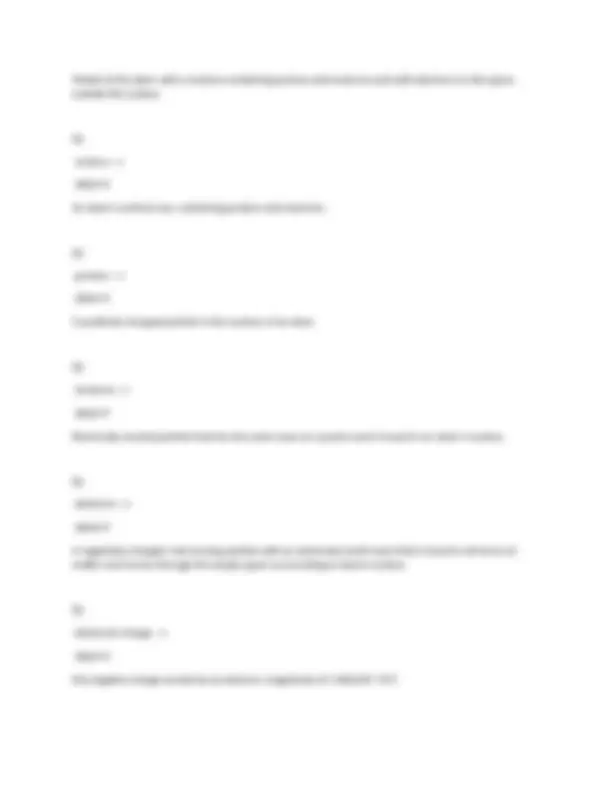


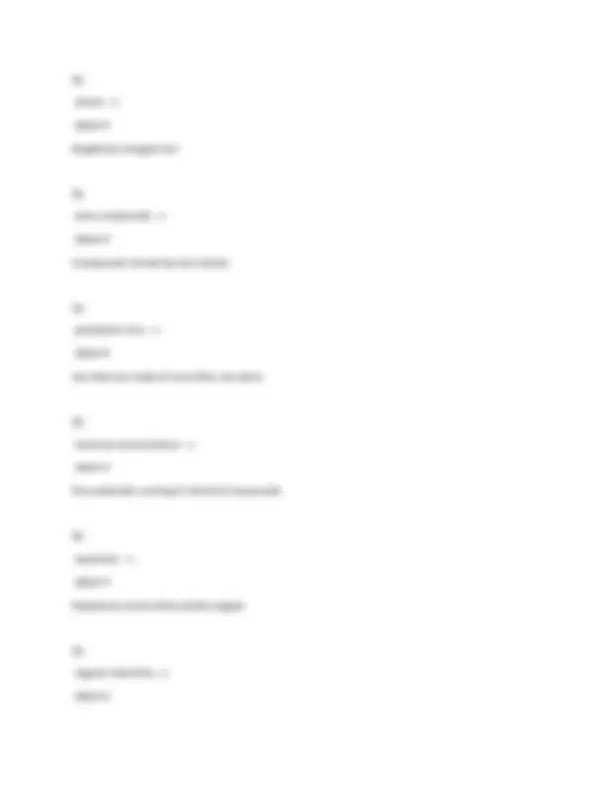
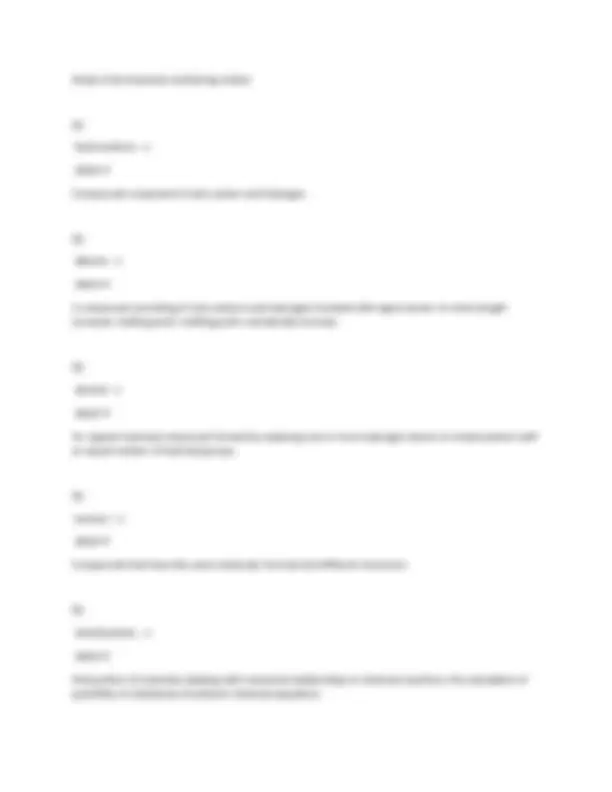
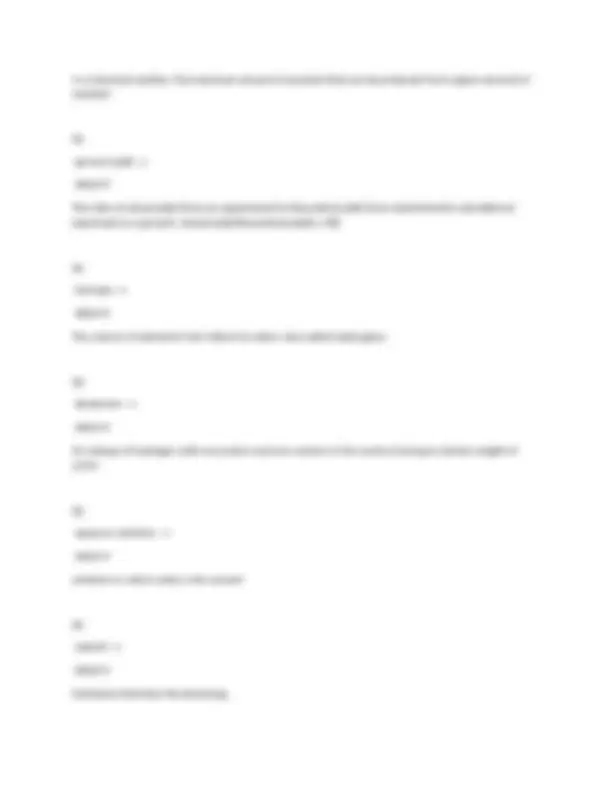
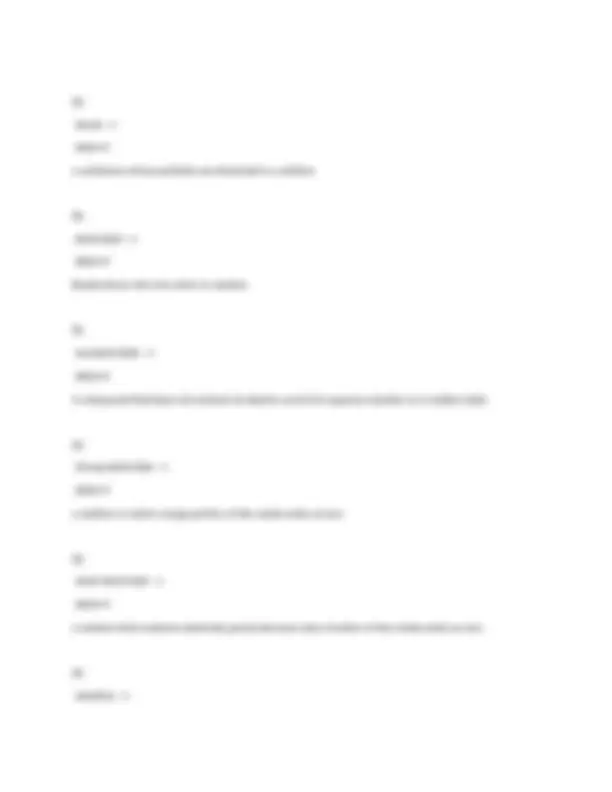



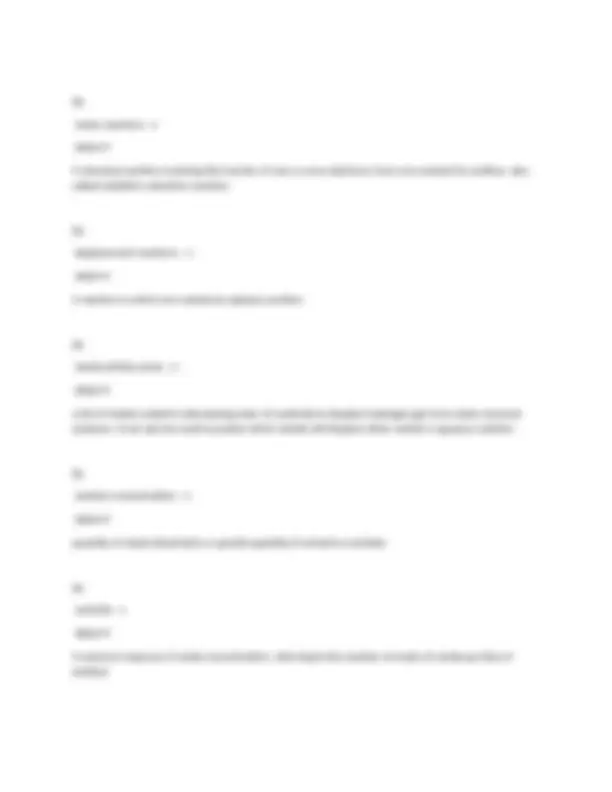
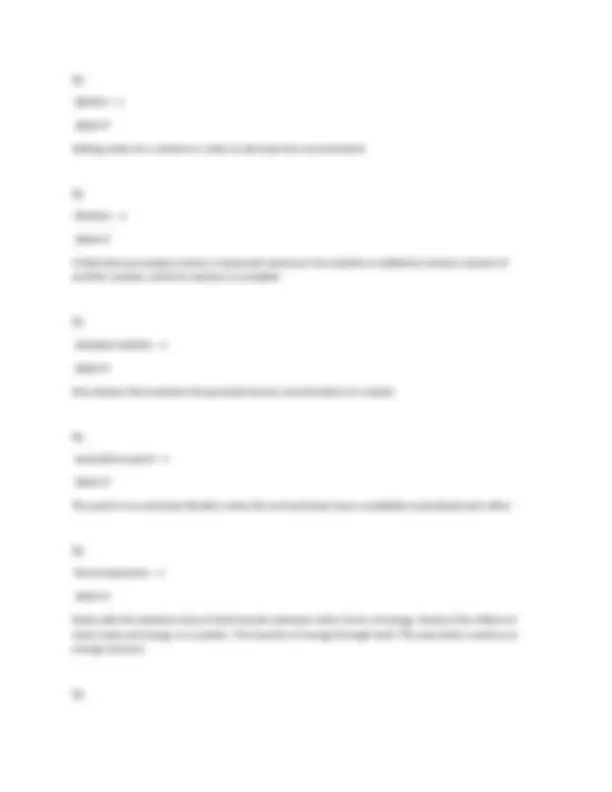

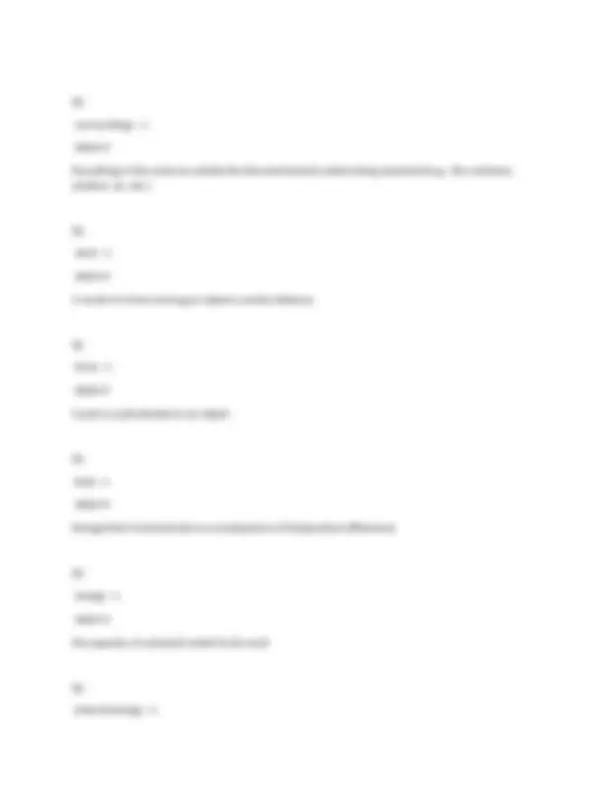



Study with the several resources on Docsity

Earn points by helping other students or get them with a premium plan


Prepare for your exams
Study with the several resources on Docsity

Earn points to download
Earn points by helping other students or get them with a premium plan
Community
Ask the community for help and clear up your study doubts
Discover the best universities in your country according to Docsity users
Free resources
Download our free guides on studying techniques, anxiety management strategies, and thesis advice from Docsity tutors
CHEM 111 ACS Final exam review questions with solutions Qs chemistry - n Ans✔ the study of matter and how it changes Qs matter - n Ans✔ Anything that has mass and takes up space Qs elements - n Ans✔ molecules composed of one kind of atom; cannot be broken into simpler units by chemical reactions. Qs atoms - n Ans✔
Typology: Exams
1 / 27

This page cannot be seen from the preview
Don't miss anything!




















CHEM 111 ACS Final Qs chemistry - n ANS✔✔ the study of matter and how it changes Qs matter - n ANS✔✔ Anything that has mass and takes up space Qs elements - n ANS✔✔ molecules composed of one kind of atom; cannot be broken into simpler units by chemical reactions. Qs atoms - n ANS✔✔ The basic building blocks of matter Qs property - n ANS✔✔ A characteristic that defines the value, appearance, and/or state of an object. Qs
molecule - n ANS✔✔ A group of atoms bonded together Qs gas - n ANS✔✔ A state of matter with no definite shape or volume Qs liquid - n ANS✔✔ A state of matter that has a definite volume but no definite shape. Qs solid - n ANS✔✔ A form of matter that has a definite shape and volume Qs states of matter - n ANS✔✔ The physical forms of matter, which include solid, liquid, and gas Qs pure substance - n ANS✔✔ A sample of matter, either a single element or a single compound, that has definite chemical and physical properties
Qs mixture - n ANS✔✔ A combination of two or more substances that are not chemically combined Qs physical properties - n ANS✔✔ Characteristics of matter that can be seen through direct observation such as density, melting point, and boiling point. Qs chemical properties - n ANS✔✔ Describe the way a substance may change, or react, to form other substances. (Ex: Flammability) Qs chemical change - n ANS✔✔ A change in matter that produces one or more new substances Qs physical change - n ANS✔✔ A change in a substance that does not involve a change in the identity of the substance Qs state change - n ANS✔✔
When matter changes from one state to another Qs intensive property - n ANS✔✔ A property that does not depend on the amount of matter present, such as pressure, temperature, or density. Qs extensive property - n ANS✔✔ A physical property, such as mass, length, and volume, that is dependent upon the amount of substance present. Qs scientific method - n ANS✔✔ A series of steps followed to solve problems including collecting data, formulating a hypothesis, testing the hypothesis, and stating conclusions. Qs scientific laws - n ANS✔✔ a statement that describes what scientists expect to happen every time under a particular set of conditions Qs hypothesis - n ANS✔✔ A testable prediction, often implied by a theory
Qs density - n ANS✔✔ Mass/Volume Qs mass - n ANS✔✔ A measure of the amount of matter in an object Qs precision - n ANS✔✔ Describes the closeness, or reproducibility, of a set of measurements taken under the same conditions. Qs accuracy - n ANS✔✔ A description of how close a measurement is to the true value of the quantity measured. Qs significant figures - n ANS✔✔ All the digits that can be known precisely in a measurement, plus a last estimated digit Qs dimensional analysis - n ANS✔✔
A technique of problem-solving that uses the units that are part of a measurement to help solve the problem Qs conversion factors - n ANS✔✔ A ratio of equivalent values used to express the same quantity in different units; is always equal to 1 and changes the units of a quantity without changing its value. Qs subatomic particles - n ANS✔✔ Particles inside an atom (protons, neutrons, electrons) Qs cathode rays - n ANS✔✔ Streams of electrons that are produced when a high voltage is applied to electrodes in an evacuated tube Qs radioactivity - n ANS✔✔ Process by which certain unstable atoms or elements undergo spontaneous disintergration, or decay, in an effort to attain a more balanced nuclear state Qs nuclear model - n ANS✔✔
Qs atomic mass unit - n ANS✔✔ A unit of mass that describes the mass of an atom or molecule,1/12 the mass of a carbon-12 atom. Qs angstroms - n ANS✔✔ Used to measure the distance between the nucleus and electron clouds of an atom. Equal to 1/10 of a nanometre. Qs atomic number - n ANS✔✔ Number of protons in an atom Qs mass number - n ANS✔✔ the sum of the number of neutrons and protons in an atomic nucleus Qs isotopes - n ANS✔✔ Atoms of the same element that have different numbers of neutrons. Qs atomic weight - n ANS✔✔
Average mass of all naturally-occurring isotopes of a given element, measured in AMU. Qs mass spectrometer - n ANS✔✔ spectroscope for obtaining a mass spectrum by deflecting ions into a thin slit and measuring the ion current with an electrometer Qs periodic table - n ANS✔✔ A chart of the elements showing the repeating pattern of their properties Qs group - n ANS✔✔ a column of elements on the periodic table, these elements will have similar properties Qs period - n ANS✔✔ A horizontal row of elements in the periodic table Qs metallic elements - n ANS✔✔ alkaline earth metals Qs
A formula that gives the elements in a compound and the ratio of atoms. Qs empirical formula - n ANS✔✔ A formula showing the lowest whole number ratio of atoms in a compound Qs molecular formula - n ANS✔✔ A chemical formula that shows the number and kinds of atoms in a molecule, but not the arrangement of the atoms. Qs structural formula - n ANS✔✔ an expanded molecular formula showing the arrangement of atoms within the molecule Qs ions - n ANS✔✔ Atoms that have gained or lost electrons Qs cations - n ANS✔✔ Positively charged ions
Qs anions - n ANS✔✔ Negatively charged ions Qs ionic compounds - n ANS✔✔ Compounds formed by ionic bonds Qs polyatomic ions - n ANS✔✔ ions that are made of more than one atom Qs chemical nomenclature - n ANS✔✔ the systematic naming of chemical compounds Qs oxyanions - n ANS✔✔ Polyatomic anions that contain oxygen Qs organic chemistry - n ANS✔✔
Qs chemical equation - n ANS✔✔ A representation of a chemical reaction that uses symbols to show the relationship between the reactants and the products Qs reactants - n ANS✔✔ Element or compound that enters into a chemical reaction Qs products - n ANS✔✔ The elements or compounds produced by a chemical reaction Qs combination reactions - n ANS✔✔ A chemical reaction in which two or more substances combine to form a single product. Qs decomposition reactions - n ANS✔✔ A reaction in which a single compound breaks down to form two or more simpler substances Qs combustion reactions - n
covers all reactions where oxygen gas combines with any other compound to produce water and carbon dioxide. to identify, look for hydrocarbons (any compound with Carbon and Hydrogen, and sometimes Oxygen) Qs formula weight - n ANS✔✔ Sum of all the masses, in AMU, present in one molecule of a molecular compound (molecular weight). Qs mole - n ANS✔✔ 6.022x10²³ particles Qs molar mass - n ANS✔✔ The mass in grams of 1 mol of a substance Qs limiting reactant - n ANS✔✔ A reactant that is totally consumed during a chemical reaction, limits the extent of the reaction, and determines the amount of product. Qs theoretical yeild - n ANS✔✔
Qs sloute - n ANS✔✔ a substance whose particles are dissolved in a solution Qs electrolyte - n ANS✔✔ Breaks down into ions when in solution Qs nonelectrolyte - n ANS✔✔ A compound that does not conduct an electric current in aqueous solution or in molten state Qs strong electrolyte - n ANS✔✔ a solution in which a large portion of the solute exists as ions Qs weak electrolyte - n ANS✔✔ a solution that conducts electricity poorly because only a fraction of the solute exists as ions Qs solvation - n
The interaction between solvent and solute particles. Qs chemical equilibrium - n ANS✔✔ In a chemical reaction, the state in which the rate of the forward reaction equals the rate of the reverse reaction, so that the relative concentrations of the reactants and products do not change with time. Qs precipitation reactions - n ANS✔✔ A reaction in which a solid, insoluble product forms upon mixing two solutions. Qs precipitate - n ANS✔✔ A solid that forms from a solution during a chemical reaction. Qs solubility - n ANS✔✔ A measure of how much solute can dissolve in a given solvent at a given temperature. Qs metathesis reactions - n ANS✔✔ in many reactions between two compounds in aqueaous solution, the positive and negative ions appear to "change partners" to form new compounds with no change in oxidation numbers